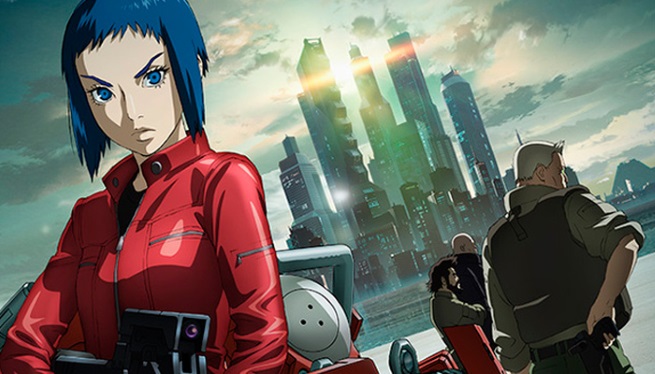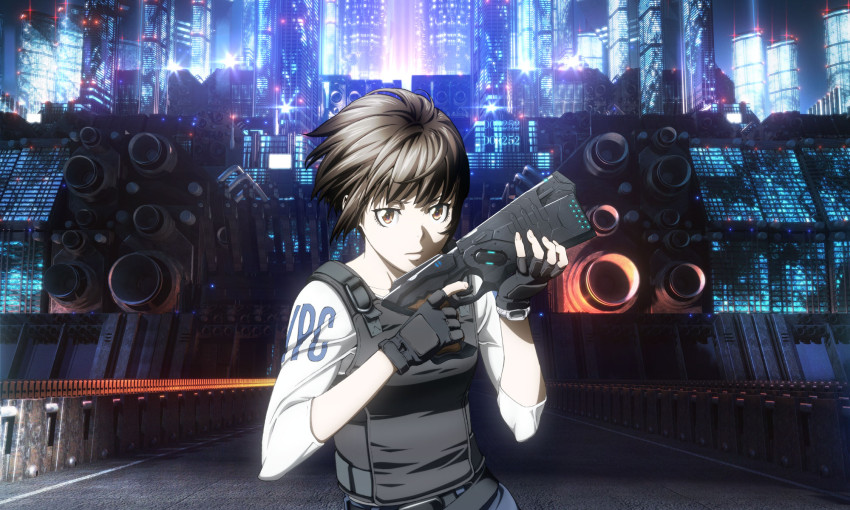Brave New Worlds
March 25, 2017 · 0 comments
Andrew Osmond pits Ghost in the Shell: Arise against PSYCHO-PASS.
 A wise man once said: “We are all interested in the future, for that is where you and I are going to spend the rest of our lives.” Anime is especially interested in the future, more than any other kind of animation. The tradition goes back to the Asimov-style human/robot future in Astro Boy half a century ago, the foundation of today’s anime, but you can go back further still. For example, the 1932 Japanese cartoon The Plane Cabbie’s Lucky Day envisaged a future in which planes are used like taxis; it was a touch optimistic, but then it was made when commercial flight barely existed.
A wise man once said: “We are all interested in the future, for that is where you and I are going to spend the rest of our lives.” Anime is especially interested in the future, more than any other kind of animation. The tradition goes back to the Asimov-style human/robot future in Astro Boy half a century ago, the foundation of today’s anime, but you can go back further still. For example, the 1932 Japanese cartoon The Plane Cabbie’s Lucky Day envisaged a future in which planes are used like taxis; it was a touch optimistic, but then it was made when commercial flight barely existed.
The two anime Ghost in the Shell: Arise and PSYCHO-PASS envisage futures in which society and humanity have changed profoundly. They’re very different visions, but with obvious affinities. Both are action shows, with central female characters commanding (largely male) security teams. Both heroines – Motoko Kusanagi in Arise and Akane Tsunemori in Psycho-Pass – start their stories young, inexperienced and all too fallible, developing as people and professionals as their stories evolve. Both heroines have ambivalent relationships with the establishment. Ostensibly they serve the system, fighting criminals and revolutionaries, yet they’re non-conformists themselves, often uneasy with the values of their worlds.
These values reflect revolutions that are history when the stories begin. In Ghost in the Shell: Arise (and other versions of the Ghost franchise), people replace some or all of their flesh and blood with prosthetic bodies called “shells.” It’s also standard practice for people to plug electronics into their brains, creating meat-machine hybrids called cyberbrains. These cyberbrains are the upgraded seats of the mind, consciousness and personality – what people call the soul, or ghost. These new people are cyborgs: part organism, past machine, benefiting from great physical and mental powers. Their bodies are massively strong; their cyberbrains give them the internet in their heads plus change.
PSYCHO-PASS also imagines a world in which machines have got into our heads. In this rigidly controlled future, every person’s mental state is continually monitored for signs of criminality. People with an unacceptably high “crime coefficient” are imprisoned, or if their coefficient is too high, they’re gorily killed on the spot. The central intelligence which makes these judgements is the Sibyl System – the name “Sibyl” borrowed from the legendary prophetess of Ancient Greece. For SF fans, the Sibyl System plays a similar role to the “Precog” psychics in the 2002 Hollywood film Minority Report, which is an obvious influence on the series.
Looking back further, PSYCHO-PASS and Ghost in the Shell each correspond, roughly speaking, to one of two great literary dystopias. PSYCHO-PASS is in the tradition of George Orwell’s novel Nineteen Eighty-Four, in which thinking the wrong thing is a crime (literally thoughtcrime) in a future order based on suffering and terror. In PSYCHO-PASS, most citizens are content, not fearful, but the threat’s still there; think in seditious, violent ways and the system will take you out.
 Meanwhile, Ghost in the Shell is closer to Aldous Huxley’s novel Brave New World. It’s not a world based on threat; rather it’s a world that transforms humans in ways that erode what makes humanity worthwhile, like love or finding one’s own meaning and selfhood. In Huxley’s novel, this transformation was caused by social conditioning and hallucinogenics. In Ghost in the Shell, it’s achieved by mass-produced brains and bodies, which reduce people – both bodies and minds – to commodities, objects. For all Kusanagi’s wonderful powers, they may have cost her something subtle and precious, an inner freedom that even the most oppressed flesh-and-blood people can access.
Meanwhile, Ghost in the Shell is closer to Aldous Huxley’s novel Brave New World. It’s not a world based on threat; rather it’s a world that transforms humans in ways that erode what makes humanity worthwhile, like love or finding one’s own meaning and selfhood. In Huxley’s novel, this transformation was caused by social conditioning and hallucinogenics. In Ghost in the Shell, it’s achieved by mass-produced brains and bodies, which reduce people – both bodies and minds – to commodities, objects. For all Kusanagi’s wonderful powers, they may have cost her something subtle and precious, an inner freedom that even the most oppressed flesh-and-blood people can access.
Interestingly, Nineteen Eighty-Four and (largely) Brave New World are told from the viewpoints of people who reject their worlds, appalled by how society has gone. As we mentioned above, both PSYCHO-PASS and Ghost in the Shell’s main characters are different – these protagonists are in the system. The rebels are their adversaries, though they’re rarely straightforward villains. One memorable example is Makashima, the main adversary in the first TV season of Psycho-Pass, who sees the Sibyl world as the ultimate “sheeple” society. He commits sickening atrocities but the series heroine – Tsunemori, who’s just entered Sibyl’s employ – finds him impossible to dismiss as a mere monster.
Director Naoyoshi Shiotani said one of the inspirations for Makashima was the Heath Ledger version of the Joker in The Dark Knight. “He’s definitely different, he’s weird, and he’s removed from all the other characters… but if you listen to him, you kind of think, ‘He’s actually not wrong.’” The same could be said of Rutger Hauer’s Roy Batty in the 1982 film Blade Runner – not surprising, as Blade Runner is a touchstone for both Psycho-Pass and Ghost in the Shell. Again, Blade Runner sets a protagonist in the future system chasing a rebel who espouses more “human” values. (Depraved maybe, but human.)
Both Arise and most of PSYCHO-PASS are made by Production I.G, and have staff in common. Most obviously, the author Tow Ubukata (Mardock Scramble) wrote Arise and the controversial PSYCHO-PASS 2; the latter features some of the most intensely disturbing anime bloodbaths since the days of Violence Jack. But both PSYCHO-PASS and Arise have been through multiple creators, who interpret one another’s visions while not necessarily agreeing with them. Fans of the shows don’t have to “agree” with them either to find their ideas stimulating, and that’s perhaps the clearest sign of a substantive work of science-fiction.
Andrew Osmond is the author of 100 Animated Feature Films.
anime, George Orwell, ghost in the shell, Japan, Naoyoshi Shiotani, Production I.G., Psycho-Pass
Leave a Reply